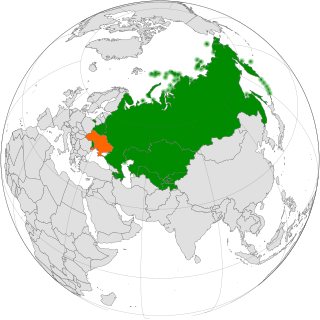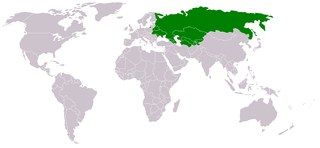Related Research Articles

The Commonwealth of Independent States (CIS) is a regional intergovernmental organization in Eurasia. It was formed following the dissolution of the Soviet Union in 1991, and is its legal successor. It covers an area of 20,368,759 km2 (7,864,422 sq mi) and has an estimated population of 239,796,010. The CIS encourages cooperation in economic, political, and military affairs and has certain powers relating to the coordination of trade, finance, lawmaking, and security, including cross-border crime prevention.

The Outer Space Treaty, formally the Treaty on Principles Governing the Activities of States in the Exploration and Use of Outer Space, including the Moon and Other Celestial Bodies, is a multilateral treaty that forms the basis of international space law. Negotiated and drafted under the auspices of the United Nations, it was opened for signature in the United States, the United Kingdom, and the Soviet Union on 27 January 1967, entering into force on 10 October 1967. As of March 2024, 115 countries are parties to the treaty—including all major spacefaring nations—and another 22 are signatories.

The Biological Weapons Convention (BWC), or Biological and Toxin Weapons Convention (BTWC), is a disarmament treaty that effectively bans biological and toxin weapons by prohibiting their development, production, acquisition, transfer, stockpiling and use. The treaty's full name is the Convention on the Prohibition of the Development, Production and Stockpiling of Bacteriological (Biological) and Toxin Weapons and on their Destruction.

The Seabed Arms Control Treaty is a multilateral agreement between the United States, Soviet Union, United Kingdom, and 91 other countries banning the emplacement of nuclear weapons or "weapons of mass destruction" on the ocean floor beyond a 12-mile (22.2 km) coastal zone. It allows signatories to observe all seabed "activities" of any other signatory beyond the 12-mile zone to ensure compliance.

Biological agents, also known as biological weapons, are pathogens used as weapons. In addition to these living or replicating pathogens, toxins and biotoxins are also included among the bio-agents. More than 1,200 different kinds of potentially weaponizable bio-agents have been described and studied to date.

The Belovezha Accords is the agreement declaring that the Union of Soviet Socialist Republics (USSR) had effectively ceased to exist and establishing the Commonwealth of Independent States (CIS) in its place as a successor entity. The documentation was signed at the state dacha near Viskuli in Belovezhskaya Pushcha, Belarus on 8 December 1991, by leaders of three of the four republics which had signed the 1922 Treaty on the Creation of the USSR:

Myechyslaw Ivanavich Hryb is a Belarusian politician who was the eleventh Chairman of the Supreme Soviet of Belarus from 28 January 1994 to 10 January 1996. In his capacity as the head of state, Hryb adopted the first Constitution of Belarus. He succeeded Stanislav Shushkevich and was head of state from 28 January to 20 July 1994 until Alexander Lukashenko replaced him in the new office called President of Belarus, which became the new head of state office. He continued as a parliamentary speaker. Hryb is now a politician in the opposition and a member of the Social-Democratic Party.
The Cook Islands maintains diplomatic relations with various countries and is a member of multilateral organisations. While the country is in free association with New Zealand, which can act on the Cook Islands' "delegated authority [...] to assist the Cooks Islands" in foreign affairs, the Cook Islands nevertheless enters into treaty obligations and otherwise "interacts with the international community as a sovereign and independent state."

Treaty on Free Trade Area is an international treaty on a free trade regime in goods signed by 8 post-Soviet states on 18 October 2011, at a meeting of the Commonwealth of Independent States (CIS) Council of Heads of Government in St. Petersburg and entered into force on 20 September 2012. It creates Commonwealth of Independent States Free Trade Area (CISFTA) among Russia, Ukraine, Belarus, Moldova, Armenia, Kyrgyzstan, Kazakhstan and Tajikistan. This Treaty and other agreements within the Commonwealth of Independent States do not regulate relations with third countries, the terms of the CIS FTA allow member states to enter into the FTA agreements with other countries, as well as to join/create custom unions.

The Budapest Memorandum on Security Assurances comprises three substantially identical political agreements signed at the OSCE conference in Budapest, Hungary, on 5 December 1994, to provide security assurances by its signatories relating to the accession of Belarus, Kazakhstan and Ukraine to the Treaty on the Non-Proliferation of Nuclear Weapons (NPT). The three memoranda were originally signed by three nuclear powers: Russia, the United States and the United Kingdom. China and France gave somewhat weaker individual assurances in separate documents.

Relations between Ukraine and the Commonwealth of Independent States (CIS) are multilateral international relations between a third state and a supranational organization.

The Agreement on the Establishment of a Free Trade Area is an international agreement on the intention to create a free trade regime in goods signed by 12 post-Soviet states on 15 April 1994, at a meeting of the Commonwealth of Independent States (CIS) Council of Heads of State in Moscow and entered into force on December 30, 1994. Article 1 indicated that this was "the first stage of the creation of the Economic Union", but on 2 April 1999 the countries agreed to remove this phrase from the agreement. Article 17 also confirmed the intention to conclude a free trade agreement in services.

Eurasian economic integration is the process of economic integration of post-Soviet states which are geographically located in the center of the continent of Eurasia. Eurasian integration has been taking shape since 1991, originally via the establishment of the Commonwealth of Independent States in 1991, as noted in the World Trade Organization report. Currently, integration is primarily implemented through organizations that are open to accession by any post-Soviet countries, such as the Commonwealth of Independent States and the Eurasian Economic Union. An economic union means the deepest stage of economic integration.

The Common Economic Space is the goal and the result of the process of economic integration of post-Soviet states envisaged by the Article 7 of the Agreement on the creation the Commonwealth of Independent States signed on 8 December 1991. According to Article 7, the High Contracting Parties indicate that through common coordinating institutions, their joint activities will consist in coordinating foreign policy activities, cooperation in the formation and development of a common economic space, common European and Eurasian markets, in the field of customs policy, in the development of transport and communication systems, cooperation in the field of environmental protection, migration policy and the fight against organized crime.
The Union of Soviet Socialist Republics, commonly known as the Soviet Union was a transcontinental country that spanned much of Eurasia from 1922 to 1991. It was a founding member of the United Nations as well as one of the five permanent members of the United Nations Security Council. Following the dissolution of the Soviet Union in 1991, its UN seat was transferred to the Russian Federation, the continuator state of the USSR.

The countries of the Commonwealth of Independent States have concluded a number of agreements among themselves in the field of citizens' mobility rights, which regulate visa-free travel, recognition of documents, cooperation in the field of employment and the common labor market.
References
- ↑ Aust, Anthony (2010-04-30). Handbook of International Law (2 ed.). Cambridge University Press. pp. 100–102. ISBN 978-0-521-11705-0.
- ↑ "Article 77 of the United Nations Convention on the Law of Treaties signed at Vienna on 23 May 1969". Archived from the original on 2 May 2016. Retrieved 6 October 2012.
- ↑ https://cis.minsk.by/reestrv2/doc/6#text
- ↑ https://cis.minsk.by/reestrv2/doc/187#text
- ↑ https://cis.minsk.by/reestrv2/doc/123#text
- ↑ https://cis.minsk.by/reestrv2/doc/257#text
- ↑ https://cis.minsk.by/reestrv2/doc/321#text
- ↑ "Liste des accords dont la Belgique est dépositaire" (in French). Ministry of Foreign Affairs of Belgium . Retrieved 2018-12-26.
- ↑ "Welcome to the Treaty Law Division". Treaty Law Division . Retrieved 2019-06-05.
- ↑ "Protocole concernant la prohibition d'emploi à la guerre de gaz asphyxiants, toxiques ou similaires et de moyens bactériologiques, fait à Genève le 17 juin 1925" (in French). Ministry of Foreign and European Affairs of France . Retrieved 2013-07-23.
- ↑ "Archivio dei Trattati internazionali Online" (in Italian). Ministry of Foreign Affairs of Italy . Retrieved 2018-12-26. Archived 2016-11-10 at the Wayback Machine
- ↑ "Treaties for which New Zealand is the depositary". Ministry of Foreign Affairs and Trade. Archived from the original on 5 November 2015. Retrieved 6 November 2015.
- ↑ "Перечень многосторонних международных договоров (Российская Федерация является депозитарием)" (in Russian). Ministry of Foreign Affairs of Russia . Retrieved 2013-07-24.
- ↑ "Depositary". Federal Department of Foreign Affairs of Switzerland . Retrieved 2013-07-24.
- ↑ "Treaties for which the UK is depositary". Foreign and Commonwealth Office . Retrieved 2014-02-04.
- 1 2 "Depositary". Foreign and Commonwealth Office. Archived from the original on 2013-01-04. Retrieved 2012-01-30.
- 1 2 "Multilateral Treaties for which the United States is Depositary". United States Department of State . Retrieved 2012-01-30.
- ↑ "National Archives NextGen Catalog". catalog.archives.gov. Retrieved 2024-07-12.
- ↑ "Multilateral Treaties Deposited with the Secretary-General". United Nations Treaty Series . Retrieved 2013-07-24.